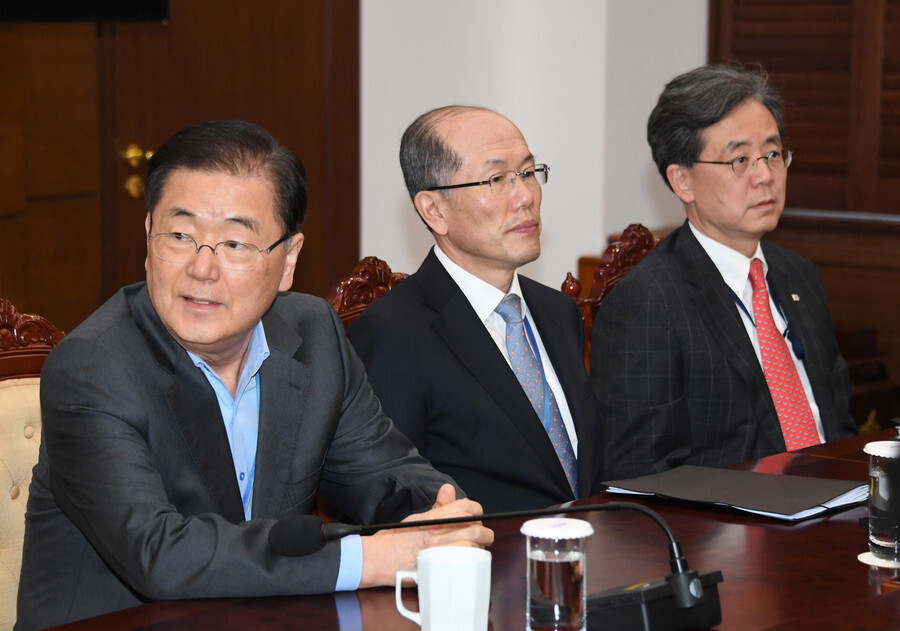hankyoreh
Links to other country sites 다른 나라 사이트 링크
S. Korea considering deploying troops to Strait of Hormuz

The Blue House National Security Council (NSC) announced on Dec. 12 that it was considering “contributing to international efforts for security in the area of the Strait of Hormuz.” Analysts read its show of a forward-looking response to US demands for troop deployments to the strait as an attempt to counter pressure from Washington to increase its share of defense costs.
The Blue House announced that it had “examined plans for protecting South Korean citizens and vessels in the area of the Strait of Hormuz and contributing to international efforts for maritime security” during a meeting of the NSC’s standing committee presided over by National Security Office Director Chung Eui-yong that day. The position signals another step forward from its message shortly after an NSC standing committee meeting in July, where it said it had “examined plans for guaranteeing safe passage for South Korean private vessels in the Strait of Hormuz.”
Observers in and around the Blue House read the change in position as bowing to persistent demands from the US to provide support and troops in the Strait of Hormuz. The South Korean government reportedly took its first steps toward agreeing to the US’ demands by relocating its Cheonghae Unit from the Gulf of Aden to the waters near the Strait of Hormuz to “protect South Korean vessels.” The US has been demanding that South Korea, Japan, and other allies take part in security-related activity at the Strait of Hormuz in order to curb Iran, extending “options” that included the deployment of troops and reconnaissance assets and support with the costs. By sending the message that Seoul is favorably considering the US’ demands, the NSC discussions were seen as part of an effort to counter demands for an unreasonable increase in South Korea’s share of defense costs.
“The US has consistently asked for us to contribute to defending the Strait of Hormuz. This is a matter of us showing a more forward-looking attitude on that,” a Blue House senior official said in a telephone interview with the Hankyoreh.
“We’re not yet at the stage of discussing whether to send troops. There are various procedures that would need to take place for troops to be dispatched,” the official added.
If South Korea does support US military activities in the strait, it appears likely to do so through the relocation of its Cheonghae Unit, which is operating nearby in the Gulf of Aden. In a plenary session on Dec. 10, the National Assembly approved in full a government plan to ratify the extended deployment of military units (the Cheonghae Unit) in the Gulf of Aden near Somalia. The Cheonghae Unit’s deployment was extended until Dec. 31, 2020.
Analysts also said the discussion was a nod toward Japan, which recently decided to send its troops to the Strait of Hormuz.
“With Japan having recently decided to send troops to Hormuz, we are also examining what to do,” a foreign affairs source said.
“This was in some respects a message to the US.”
By Seong Yeon-cheol, Lee Wan, and Noh Ji-won, staff reporters
Please direct comments or questions to [english@hani.co.kr]

Editorial・opinion
![[Column] Has Korea, too, crossed the Rubicon on China? [Column] Has Korea, too, crossed the Rubicon on China?](https://flexible.img.hani.co.kr/flexible/normal/500/300/imgdb/original/2024/0419/9317135153409185.jpg) [Column] Has Korea, too, crossed the Rubicon on China?
[Column] Has Korea, too, crossed the Rubicon on China?![[Correspondent’s column] In Japan’s alliance with US, echoes of its past alliances with UK [Correspondent’s column] In Japan’s alliance with US, echoes of its past alliances with UK](https://flexible.img.hani.co.kr/flexible/normal/500/300/imgdb/original/2024/0419/2317135166563519.jpg) [Correspondent’s column] In Japan’s alliance with US, echoes of its past alliances with UK
[Correspondent’s column] In Japan’s alliance with US, echoes of its past alliances with UK- [Editorial] Does Yoon think the Korean public is wrong?
- [Editorial] As it bolsters its alliance with US, Japan must be accountable for past
- [Guest essay] Amending the Constitution is Yoon’s key to leaving office in public’s good graces
- [Editorial] 10 years on, lessons of Sewol tragedy must never be forgotten
- [Column] A death blow to Korea’s prosecutor politics
- [Correspondent’s column] The US and the end of Japanese pacifism
- [Guest essay] How Korea turned its trainee doctors into monsters
- [Guest essay] As someone who helped forge Seoul-Moscow ties, their status today troubles me
Most viewed articles
- 1[Column] The clock is ticking for Korea’s first lady
- 2Samsung barricades office as unionized workers strike for better conditions
- 3S. Korea, Japan reaffirm commitment to strengthening trilateral ties with US
- 4[News analysis] After elections, prosecutorial reform will likely make legislative agenda
- 5[Editorial] When the choice is kids or career, Korea will never overcome birth rate woes
- 6Japan officially says compensation of Korean forced laborers isn’t its responsibility
- 7[Editorial] As it bolsters its alliance with US, Japan must be accountable for past
- 8Why Israel isn’t hitting Iran with immediate retaliation
- 9[Column] Has Korea, too, crossed the Rubicon on China?
- 10All eyes on Xiaomi after it pulls off EV that Apple couldn’t